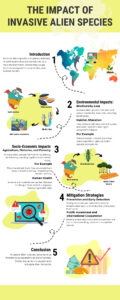Roadmap for Answer Writing Introduction: Introduce the rapid growth of EV adoption globally. Highlight recent sales statistics (e.g., India’s record sales of 965,868 units in the first eight months of 2023, a 65% year-on-year increase). How Electric Vehicles Contribute to Reducing Carbon Emissions: Zero Tailpipe ...
The predicted scenario of an ice-free Arctic by 2040 could have significant impacts on oceans globally and specifically affect India in several ways:1. Global Oceanic Impact: - Sea Level Rise: Melting Arctic ice contributes to sea level rise globally. As sea ice melts, it doesn't directly raise seaRead more
- The predicted scenario of an ice-free Arctic by 2040 could have significant impacts on oceans globally and specifically affect India in several ways:1. Global Oceanic Impact:
– Sea Level Rise: Melting Arctic ice contributes to sea level rise globally. As sea ice melts, it doesn’t directly raise sea levels (since it displaces its own weight in water), but the loss of ice from Greenland and Arctic glaciers does contribute significantly.
– Altered Ocean Circulation:The Arctic plays a crucial role in global ocean circulation patterns, particularly through the thermohaline circulation (ocean conveyor belt). Changes in sea ice extent can disrupt this circulation, potentially affecting climate patterns worldwide.
– Habitat Loss: Arctic sea ice provides critical habitat for various species, including polar bears, seals, and Arctic seabirds. Melting ice threatens their habitats and food sources, leading to potential population declines.2. Specific Impact on India:
– Sea Level Rise:Coastal areas of India, particularly low-lying regions like the Sundarbans in West Bengal and parts of Gujarat and Kerala, are vulnerable to sea level rise. This could lead to increased coastal erosion, salinization of freshwater sources, and displacement of coastal communities.
– Monsoon Patterns: Changes in Arctic ice can influence atmospheric circulation patterns, potentially affecting the Indian monsoon. Variability in monsoon patterns could impact agriculture, water availability, and livelihoods across the country.
– International Relations: The opening up of Arctic sea routes due to reduced ice cover could present opportunities and challenges for India. It could potentially shorten shipping routes between Asia and Europe, affecting maritime trade and strategic interests.In conclusion, the melting of Arctic ice and the prospect of an ice-free Arctic by 2040 will have far-reaching consequences for oceanic conditions globally, including sea level rise and changes in ocean circulation. India, as a coastal nation and a country highly dependent on monsoonal rainfall, faces specific risks related to sea level rise, altered monsoon patterns, and potential geopolitical shifts due to changes in Arctic dynamics.


Model Answer Introduction The adoption of electric vehicles (EVs) is witnessing exponential growth worldwide as nations seek sustainable alternatives to fossil fuel-powered vehicles. In India, EV sales reached a record 965,868 units in the first eight months of 2023, marking a robust 65% year-on-yeaRead more
Model Answer
Introduction
The adoption of electric vehicles (EVs) is witnessing exponential growth worldwide as nations seek sustainable alternatives to fossil fuel-powered vehicles. In India, EV sales reached a record 965,868 units in the first eight months of 2023, marking a robust 65% year-on-year growth.
How Electric Vehicles Contribute to Reducing Carbon Emissions
Key Benefits Compared to Traditional Combustion Engine Vehicles
Conclusion
The rapid adoption of EVs presents a viable path for reducing greenhouse gas emissions and combating climate change. With numerous advantages over traditional vehicles, a comprehensive approach involving financial, legislative, and educational elements is essential to accelerate the transition to electric mobility.
See less